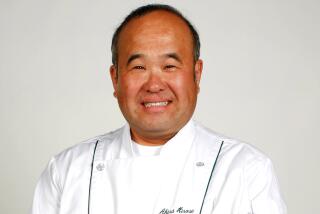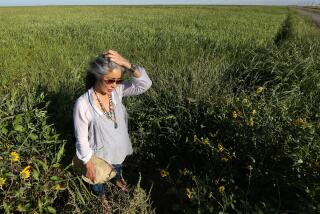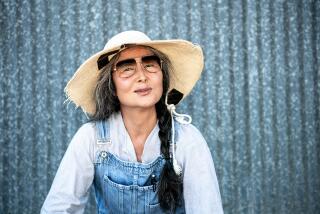Fish Farmer Continues Family Tradition
- Share via
As Joe Akiyama tossed bait into a pond, the shapes began to move. From under lily pads, multicolored, foot-long koi darted for the food. Suddenly the water became a moving mass of hues, like a watercolor painting changing shape.
“They can recognize people; they’re intelligent,” Akiyama said, staring at the feeding frenzy. “They know who feeds them, and they swim over by your side.”
Akiyama and his wife, Sumie, are keepers of tradition. They have operated the Pacific Goldfish Farm in Westminster since the time before Orange County got its malls and freeways. Unlike other farmers who make their living from the soil, they raise and sell varieties of carp and tropical fish with fanciful names like calico fantail and sarasa ryukin .
Their business has persisted because of support from devoted hobbyists. Although prize koi can sell for more than $100,000 in Japan, the Akiyamas sell more inexpensive tropical fish--koi and goldfish--for enjoyment.
“The way the fish swim around in the water has a calming effect,” said Joe Akiyama, 68, a Nisei, or second-generation Japanese-American. “People buy them to relieve stress.”
The goldfish farm was started by Kiyomi Henry Akiyama, Joe’s father, in 1927. Kiyomi Akiyama was an immigrant pioneer who moved from Nagano-ken, Japan, to Canada to escape the Imperial Japanese Army’s draft during the Russo-Japanese War of 1904-05. He migrated to Orange County in 1907.
Unable to acquire land for farming, Kiyomi Akiyama decided to turn his goldfish-raising hobby into a business. He settled on a 40-acre site in Westminster. Joe Akiyama remembers growing up when six-lane Golden West Boulevard was a dirt road and the San Diego Freeway didn’t exist.
During World War II, the Akiyamas were herded into internment camps along with 120,313 other Japanese-Americans on the West Coast. The family was sent to Poston I, an Arizona desert camp where 1,851 others from Orange County were interned. Kiyomi Akiyama eventually began raising koi in the camp, using water diverted from the nearby Colorado River.
His son inherited the Westminster business as a high school student, shortly after the war started and earlier than planned. His father was not eligible for citizenship and was concerned that he might have to surrender the business because of the evacuation. Under the son’s name, the business could continue.
After the war, the fish farm grew under Joe Akiyama’s management until the San Diego Freeway sliced through the 40-acre site. Later, the Westminster Mall took more of the land, and Akiyama was forced to lay off 35 workers.
Today the Akiyamas maintain a store on a one-acre plot in a compound surrounded by a stone wall. It is a calm place with a Japanese-style garden and scores of metal tanks holding fish.
Several years ago, Akiyama decided to reduce his involvement to part time because of the stress of constantly tending to business matters, such as making sure all the oxygen pumps are working.
“It’s a lot of work raising living things,” he said. “You’re tied to it day and night, and you seldom get away. A lot of people say they wish they had my job. As a hobby, it’s calming, but as a business, not so.”
To find serenity, Akiyama increasingly spends time at his own hobby.
“I go fishing,” he said.
More to Read
Sign up for Essential California
The most important California stories and recommendations in your inbox every morning.
You may occasionally receive promotional content from the Los Angeles Times.










